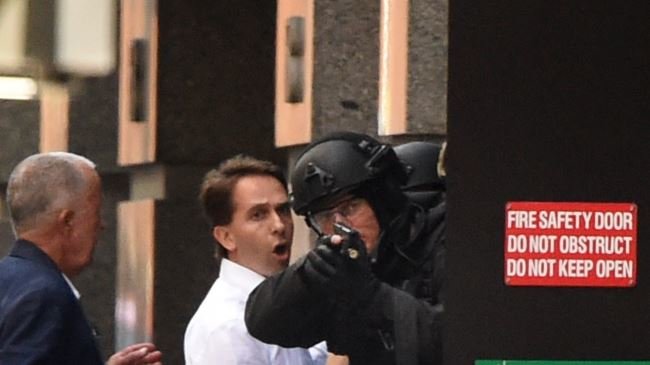
Heavily armed Australian police stormed a Sydney cafe early on Tuesday morning (local time) and freed a number of hostages being held there at gunpoint, in a dramatic end to a 16-hour siege in which three people including the attacker were killed.
Police have not publicly identified the gunman but a police source named him as Man Haron Monis, an Iranian refugee and self-styled sheikh known for sending hate mail to the families of Australian soldiers killed in Afghanistan and who was charged last year with being an accessory to the murder of his ex-wife.
During the siege at the Lindt cafe in Sydney’s central business district, hostages had been forced to display an Islamic flag, igniting fears of a jihadist attack. [Source: Reuters News]
If you want to make sure we have more occurrences like this one, then be sure to adapt the attitude recommended by the Sydney (Australia) Morning Herald. In their editorial published in the midst of the crisis, the paper stated:
The siege in the Lindt cafe in Martin Place has tested Australians as individuals, and Australia as a civil and democratic society.
…we face an even more difficult test of our empathy as well. How should we feel for the perpetrator so far witnessed and his family? While we do not know his story or his motivation, we know he was once someone just like those people whose lives he has now treated with such disdain. He must have loved ones, too. Forgiving him will be very difficult, and it will take time. Without forgiveness, though, we have to live with destructive hate.
Forgiving murder — or wallowing in hatred? One or the other? This is an absolutely false alternative.
Holding people accountable for their actions, and calling them what they are — murderers, terrorists, abusers — does not constitute destructive hate. In fact, it signifies a perfectly reasonable, objective and justified method for practicing the principle of justice.
The principle of justice means giving somebody what they deserve — no more, and no less. “Giving” in this context does not only refer to action, as in a criminal trial. It also refers to how you regard such people in your minds.
When viewing actions such as these, it’s healthy and fair to make judgments — rational judgments, backed up by facts, but judgments all the same. Why? Because if you refuse to make judgments, you’ll play right into what the next terrorist plotters are counting on: Your meekness and unwillingness to regard murder and treachery for what they really are.
This editorial is telling the actual and potential victims of the attack to basically, “suck it up.”
It goes on to say:
The next test is to ensure we see this sad event for what it is – and what it is not. While there were a number of instances on Monday when Sydneysiders and the media jumped to conclusions about the link between this event and other incidents around the city, in most cases people were rightfully reluctant to jump to conclusions about the motivations of the gunman or the extent of his plans.
Nonetheless, a temptation lingers in the community to catastrophise about such criminal behaviour; to believe that because we have endured one siege from at least one deranged individual, we are at risk of many more. Rationally, that is highly unlikely.
Actually, everybody knows that acts of terrorist and criminal violence are on the rise. Such actions are almost always done in the name of some cause or purpose, almost always Islamic fundamentalism. While it’s never rational to automatically conclude anything without all (or even any) of the relevant facts, it’s equally irrational to engage in pretense or denial.
The authors of this editorial are basically asking victims of terrorist attacks (potentially any of us) to shut down their thinking for the sake of those who would literally destroy them in an act of violence. They’re implying that it’s not only wrong to leap to unfounded conclusions; but that it’s wrong to even hypothesize based upon repeated experiences. Presumably, it’s morally mandatory for our police and legal authorities — empowered with the task of protecting us — to refrain from hypothesizing too. This is just as insane in theory as it would be literally suicidal in practice.
The authors of this editorial distort and evade the proper and rational understanding of the concept “empathy.” Empathy is a valuable and necessary skill, in human associations applying to peaceful people. You practice empathy in the spirit of rationally self-interested good will so that a peaceful, nonviolent personal or business association might go better for both or all parties involved. You don’t apply empathy to people who are intent on destroying you physically. When dealing with violent criminals, your concern is with safety, accountability and justice. Empathy does not apply to those who initiate violence, and they don’t deserve any.
It’s an inversion of morality and — quite frankly — psychologically sadistic to suggest that any of us should feel empathy towards those who plainly wish to take innocent people hostage, maim or torture them, or murder them.
Why on earth is this even a question? Yet this is exactly the sort of mindless, self-destructive prattle we continue to hear from spiritual, psychological and political leaders every time something like this happens. I’m sick of it, but weary of it as well.
When you excuse and feel pity for the unforgivable, you render justice an irrelevant virtue. Don’t give the moral high ground to people who claim you should love your enemies. It’s a dishonest act of treason against your own self-interest, along with justice itself.
Be sure to “friend” Dr. Hurd on Facebook. Search under “Michael Hurd” (Rehoboth Beach DE). Get up-to-the-minute postings, recommended articles and links, and engage in back-and-forth discussion with Dr. Hurd on topics of interest. Also follow Dr. Hurd on Twitter at @MichaelJHurd1
